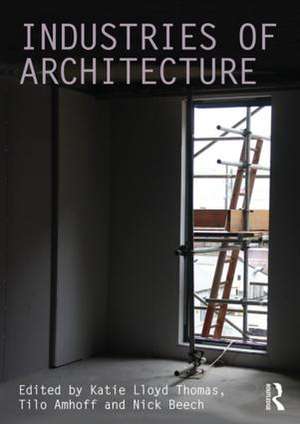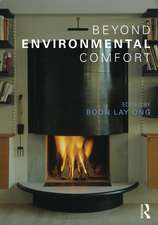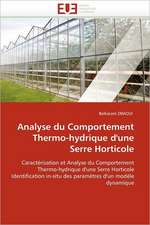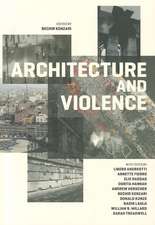Industries of Architecture: Critiques
Editat de Katie Lloyd Thomas, Tilo Amhoff, Nick Beechen Limba Engleză Paperback – 19 noi 2015
| Toate formatele și edițiile | Preț | Express |
|---|---|---|
| Paperback (1) | 385.97 lei 3-5 săpt. | +29.59 lei 4-10 zile |
| Taylor & Francis – 19 noi 2015 | 385.97 lei 3-5 săpt. | +29.59 lei 4-10 zile |
| Hardback (1) | 997.91 lei 6-8 săpt. | |
| Taylor & Francis – 16 noi 2015 | 997.91 lei 6-8 săpt. |
Din seria Critiques
-
 Preț: 346.87 lei
Preț: 346.87 lei -
 Preț: 328.06 lei
Preț: 328.06 lei - 12%
 Preț: 328.00 lei
Preț: 328.00 lei - 12%
 Preț: 328.00 lei
Preț: 328.00 lei - 15%
 Preț: 433.19 lei
Preț: 433.19 lei - 26%
 Preț: 990.57 lei
Preț: 990.57 lei - 13%
 Preț: 324.41 lei
Preț: 324.41 lei - 28%
 Preț: 990.09 lei
Preț: 990.09 lei - 25%
 Preț: 993.87 lei
Preț: 993.87 lei -
 Preț: 474.19 lei
Preț: 474.19 lei - 12%
 Preț: 338.81 lei
Preț: 338.81 lei - 22%
 Preț: 325.22 lei
Preț: 325.22 lei -
 Preț: 475.16 lei
Preț: 475.16 lei - 25%
 Preț: 769.51 lei
Preț: 769.51 lei - 14%
 Preț: 314.33 lei
Preț: 314.33 lei - 16%
 Preț: 244.94 lei
Preț: 244.94 lei - 15%
 Preț: 248.59 lei
Preț: 248.59 lei
Preț: 385.97 lei
Preț vechi: 419.53 lei
-8% Nou
Puncte Express: 579
Preț estimativ în valută:
73.86€ • 80.21$ • 62.05£
73.86€ • 80.21$ • 62.05£
Carte disponibilă
Livrare economică 01-15 aprilie
Livrare express 15-21 martie pentru 39.58 lei
Preluare comenzi: 021 569.72.76
Specificații
ISBN-13: 9781138946828
ISBN-10: 1138946826
Pagini: 366
Ilustrații: 1 black & white tables, 79 black & white halftones, 26 black & white line drawings
Dimensiuni: 174 x 246 x 20 mm
Greutate: 0.7 kg
Ediția:1
Editura: Taylor & Francis
Colecția Routledge
Seria Critiques
Locul publicării:Oxford, United Kingdom
ISBN-10: 1138946826
Pagini: 366
Ilustrații: 1 black & white tables, 79 black & white halftones, 26 black & white line drawings
Dimensiuni: 174 x 246 x 20 mm
Greutate: 0.7 kg
Ediția:1
Editura: Taylor & Francis
Colecția Routledge
Seria Critiques
Locul publicării:Oxford, United Kingdom
Public țintă
Postgraduate and UndergraduateCuprins
1. Industries of Architecture Tilo Amhoff, Nick Beech and Katie Lloyd Thomas Part 1: Architecture and the Representation of Industry 2. Allan Sekula’s Architectures of Industry and Industries of Architecture Gail Day 3. Walter Gropius’ Silos and Reyner Banham’s Grain Elevators as Art-objects Catalina Mejía Moreno Part 2: Architecture Responds to Industry 4. The Collaborations of Jean Prouvé and Marcel Lods: An open or closed case? Kevin Donovan 5. The Production of the Commons: Mies van der Rohe and the art of industrial standardisation Mhairi McVicar 6. Modular Men: Architects, labour and standardisation in mid-twentieth century Britain Christine Wall 7. Post 1965 Italy: The ‘Metaprogetto sì e no’ Alicia Imperiale Part 3: The Construction Site 8. Introduction to Sérgio Ferro Felipe Contier 9. Dessin/Chantier: An Introduction Sérgio Ferro 10. Architecture as Ensemble: A matter of method João Marcos Almeida de Lopes 11. Factory Processes and Relations in Indian Temple Production Megha Chand Inglis 12. Construction Sites of Utopia Silke Kapp Part 4: The Work of Architects 13. Architectural Work :: Immaterial Labour Peggy Deamer 14. Form as/and Utopia of Collective Labour: Typification and collaboration in East German industrialised construction Torsten Lange 15. Tools for Conviviality: Architects and the limits of flexibility for housing design in New Belgrade Tijana Stevanović 16. Counting Women in Architecture Karen Burns and Justine Clark Part 5: Economy 17. Building Design: A component of the building labour process Jörn Janssen 18. The Place of Architecture in the New Economy Andrew Rabeneck 19. Financial Formations Matthew Soules Part 6: Law and Regulation 20. French Architects’ Use of the Law Robert Carvais 21. The Architectural Discourse of Building Bureaucracy: Architects’ project statements in Portugal in the 1950s Ricardo Agarez 22. Regulatory Spaces, Physical and Metaphorical: On the legal and spatial occupation of fire-safety legislation Liam Ross 23. Common Projects and Privatized Potential: Projection and representation in the Rotterdam Kunsthal Stefan White Part 7: Technologies of Management 24. The Electrification of the Factory, or the Flexible Layout of Work(s) Tilo Amhoff 25. An ‘Architecture of Bureaucracy’: Technocratic planning of government architecture in Belgium in the 1930s Jens van de Maele 26. Laboratory Architecture and the Deep Membrane of Science Sandra Kaji-O’Grady and Chris L. Smith 27. Performativity and Paranoia (Or how to do the ‘Internet of Things’ with words) Claudia Dutson Part 8: Contemporary Questions 28. On Site Nick Beech, Linda Clarke, Christine Wall with Ian Fitzgerald 29. BIM: The Pain and the Gain John Gelder 30. The Sustainable Retrofit Challenge: What does it mean for architecture? Sofie Pelsmakers and David Kroll 31. Risk and Reflexivity: Architecture and the industries of risk-distribution Liam Ross 32. Unapproved Document Part O: Designing for ageing Sarah Wigglesworth
Recenzii
'Industries of Architecture invites us to rethink what constitutes the ‘work’ of architecture – in the past, the present, and in the future. In a reversal of the usual emphasis in the humanities on design as the exclusive field of architects’ creative endeavours, Industries of Architecture offers an alternative view – one in which architects’ engagement with labour, with legal systems, with manufacturing practices, and with business organisation are no longer treated as contingent, but as central to what architects do.' - Adrian Forty, Professor Emeritus of Architectural History, Bartlett School of Architecture, UCL
'Industries of Architecture offers intriguing new evidence of the breadth and depth of architecture’s cultural diffusion. Its exploration of myriad aspects of architectural production supplies valuable historical documentation and useful theoretical strategies to shift the focus of architectural history away from the singular presence of architectural objects and toward the conditions and connections that make those objects possible.' - Aggregate Architectural History Collaborative
'Industries of Architecture offers intriguing new evidence of the breadth and depth of architecture’s cultural diffusion. Its exploration of myriad aspects of architectural production supplies valuable historical documentation and useful theoretical strategies to shift the focus of architectural history away from the singular presence of architectural objects and toward the conditions and connections that make those objects possible.' - Aggregate Architectural History Collaborative
Descriere
International contributors from industry set out the most pressing contemporary concerns for the production of architecture, and the academic contributions ask what methods and objects are appropriate for this emerging field of study.






